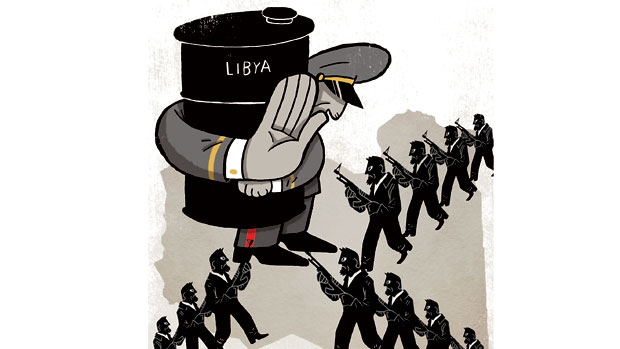
Focusing on the dangers of terrorist groups in Iraq and Syria, the world seems to be forgetting about a dilemma created in North Africa three years ago since the killing of former Libyan leader, Muammar Gaddafi, and the rise of Islamists there. Libyans feel that they have been abandoned by the international community and are left at the mercy of those regional powers that had helped by supplying arms and money to topple Gaddafi — as if only to promote the Islamists to rule Libya. No need to repeat that four decades of Gaddafi’s rule witnessed little development in the society, institutions or any effort to rebuild the country — not even a decent army or security forces except for Gaddafi’s own bodyguards and secret services. Rhetoric about a ‘popular republic’ and people’s committees was just means to secure his rule, as he was afraid of developing any socio-political trends that could topple him. Concerned parties that scrambled to Nato to topple Gaddafi knew this and some of them found the best environment existing in Libya to nourish Islamists. As Ikhwan (Muslim Brotherhood) were not that strong there, they needed allies on the ground and violent militias of Misrata were the option, combining Misrata’s bitter history with Gaddafi (and the rest of Libya as a Misratan identified the country with the late leader) and military and financial support of the rich regional supporters of the Brotherhood.
Libyans are now comparing atrocities committed by Islamist militant groups and their collaborators, the Misrata Brigades, with those committed by the Gaddafi regime during the uprising. People in Libya talk about far darker and bloodier days that they have witnessed under the Islamists’ rule — not only now, during the latest spate of fighting in Benghazi and in the outskirts of Tripoli, but all along in the past three years.
As western powers finished the job of removing Gaddafi, Libya was left to regional players — mainly Qatar. Doha managed to form an alliance of Muslim Brotherhood, militant Misratans and liberal business figures close to it in a transitional council to oversee elections that brought the Islamists to the helm in a “legitimate” way. For various reasons, these alliances faltered, but mainly due to internal fights over money and power — and the Brotherhood are known for their greedy exclusion of others. During this period, money and arms pouring into the country helped militants affiliated with various terrorist groups under Islamist banners. That helped to make Libya — with no central authority, fragmented tribalism and almost complete lawlessness — a perfect terrorist base and a transit point for those eager to join Daesh (Islamic State of Iraq and the Levant) through Turkey and serve as a launch-pad for attacks on Tunisia, Algeria and Egypt.
The short tenure of Muslim Brotherhood’s rule in Egypt was an opportunity to push Libya more into an ‘Islamist hub’ in North Africa.
Regional players — mainly Qatar and Turkey — managed to get a western consent to the argument of ‘inclusive moderate Islamist rule’ in Libya to help Tunisia in balancing the ‘crackdown on the Brotherhood in Egypt’. Irrespective of whether the US and major European countries bought that Qatari-Turkish argument or whether it coincided with their strategy in the region to advance their interests, the end-result is that a vast country with rich oil reserves is now on the verge of being a failed state — more dangerous than Somalia.
The only possible way out of this mess for Libya is to have an inclusive rule — not dominated by Islamists who do not care for national interests — so that they can start rebuilding the country. The ongoing war started as the Muslim Brotherhood and its allies lost the majority in the last election. The group members were not ready to accept the fact that the ordinary people did not want to see them in power.
The ultimate goal is to prevent Libya from turning into a large camp for terrorists with access to oil reserves and close proximity to regional powers (Egypt and Algeria) that they can destabilise easily. Even in the fight against terrorism in Iraq and Syria, it is vital to cut off militants’ recruitment sources like in Libya. Therefore, it is not energy or wealth that drives concern about Libya, but it is the dangerous consequences of having a ‘failed’ state in North Africa that acts like a magnet for terrorism. Even if the whole world is indifferent to what is going on in Libya, at least Egypt and Algeria should not be. These two countries will have to step up their efforts to uproot the danger being nurtured there.
Dr Ahmad Mustafa is an Abu Dhabi-based journalist.







